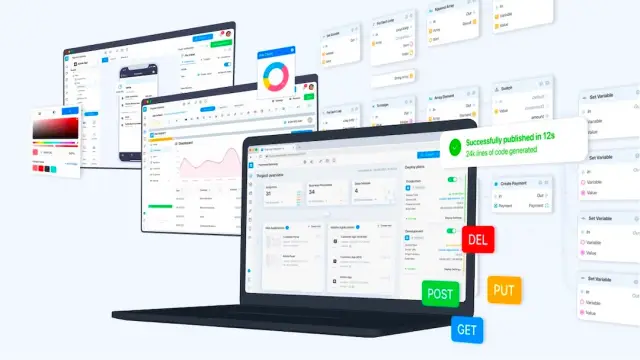Harnessing the Power of Social Media for Your Startup
Discover how startups can harness the power of social media to expand their reach, foster engagement, and drive growth. Learn strategies, tools, and best practices for mastering the art of social media marketing.

Understanding the Value of Social Media for Startups
For startups, social media can be a game-changer in building brand awareness, connecting with a target audience, and driving customer acquisition. The versatility of social media platforms and the ability to create tailored content provide endless opportunities to engage users, amplify messaging, and generate buzz. Utilizing social media as a marketing tool can offer several benefits for startups:
- Brand Awareness: Establishing a strong social media presence exposes your startup to a global audience. With the right content and engagement strategies, you can cultivate brand recognition and make your business more visible.
- Customer Connection: Social media provides a direct line of communication with your customers, allowing you to address their concerns, receive feedback, and build relationships. This helps improve customer satisfaction and loyalty.
- Cost-Efficient Marketing: Startups often have limited marketing budgets. Social media offers a cost-effective way to reach a large audience without spending significant amounts on advertising.
- Increased Website Traffic: Sharing valuable content, engaging with users, and implementing calls-to-action in your social media posts can drive traffic to your website and generate leads.
Considering the vast potential of social media, it’s essential for startup founders to develop a solid understanding of the platforms relevant to their target audience and create a comprehensive strategy for leveraging their influence.
Building a Strong Social Media Presence
Developing a thriving social media presence is an essential step in capturing the attention of potential customers, investors, and industry partners. To successfully build your startup's presence, follow these best practices:
- Choose the Right Platforms: Research each platform and assess their demographics, engagement patterns, and content options. Decide which platforms best align with your target audience and business goals.
- Set Clear Goals: Define your objectives for each social media platform. Your goals could include increasing brand awareness, driving website traffic, generating leads, or fostering customer engagement. Establishing goals helps you create relevant content and measure your success.
- Understand Your Target Audience: Identify your target audience and create a buyer persona to guide your content decisions. Keep your audience’s preferences, needs, and interests in mind as you develop content strategies.
- Create a Consistent Brand Identity: Develop a consistent look and feel for your profiles, including branded visuals, color schemes, and tone of voice. This consistency helps establish brand recognition and makes it easier for users to remember and trust your startup.
- Develop a Content Plan: Plan your content in advance and maintain a balance between promotional material and valuable content. Regularly share updates, blog posts, behind-the-scenes insights, and other relevant information to keep your followers engaged and interested.
- Optimize Your Profiles: Ensure that your bio and profile information are complete, informative, and up-to-date. Include relevant keywords, links to your website, and a clear value proposition to capture user interest.
By taking a structured approach to your social media presence, you can create a solid foundation for meaningful engagement and growth.

Strategies for Engaging Your Target Audience
Achieving meaningful user engagement is vital for successful social media campaigns. Engaging your target audience helps build relationships, fosters loyalty and ultimately, converts users into customers. To boost audience engagement, consider implementing the following strategies:
- Create Interactive Content: Develop content that prompts interaction, such as polls, quizzes, and questions. This stimulates user engagement and provides valuable insights into your target audience's preferences and opinions.
- Respond Promptly: Monitor your social media channels for comments, questions, and messages. Respond promptly and professionally, demonstrating your commitment to customer service and appreciation for user engagement.
- Host Contests and Giveaways: Encourage followers to spread the word about your startup by running contests, giveaways, and promotions that require users to share your content or tag friends in the comments.
- Share User-Generated Content: Showcase your customers by sharing their photos, reviews, or testimonials. This promotes a sense of community and encourages more users to share their experiences with your product or service.
- Collaborate with Influencers: Partner with influencers in your industry to increase your startup's credibility and exposure. Choose influencers whose values align with your brand and whose followers make up your target audience.
- Utilize Hashtags: Research and utilize relevant industry and trending hashtags to increase the visibility of your content and reach new users.
Consistently employing these strategies can help increase user engagement, ultimately driving better results for your social media campaigns and further propelling your startup towards success.
Mastering Content Creation and Curation
Creating and curating compelling content is crucial for startups looking to capitalize on the power of social media. High-quality, engaging content can set your brand apart from the competition, attract new followers, and encourage user interaction. Here are some practical steps to master the art of content creation and curation:
- Understand your audience: Research and analyze your target market to discover their interests, preferences, and pain points. This will help you create relevant, targeted content that appeals to and resonates with your audience.
- Maintain a consistent brand voice: Develop a consistent brand voice and messaging style that reflects your startup's values and identity. This will help reinforce brand recognition and create a cohesive online presence across various social media platforms.
- Value-driven content: Focus on publishing content that offers value to your audience, be it by addressing their pain points, providing solutions, or simply sharing informative and engaging material. This will establish your startup as a thought leader in your industry and encourage brand loyalty.
- Visual storytelling: Utilize rich visuals, such as images, videos, and infographics, to tell engaging stories and enhance your written content. Visuals not only improve comprehension but also make your content more shareable and appealing.
- Share user-generated content: Encourage and share user-generated content (UGC) from your customers, partners, or influencers. Showcasing real-life experiences, testimonials, or reviews can add credibility to your brand and foster a sense of community.
- Mix promotional and non-promotional content: Strike a balance between promotional content and non-promotional educational or entertaining content. Constant self-promotion can deter users from following and engaging with your brand.
- Curate high-quality content: Share relevant and valuable third-party content that complements your own original content. This not only enriches your content mix but also demonstrates your commitment to providing value to your audience.
- Schedule and automate: Develop a consistent posting schedule to maintain visibility on social media platforms. Utilize social media scheduling tools to automate your content distribution, ensuring that your content reaches your audience at optimal times.
Analytics and Measuring Success
Measuring the success of your social media efforts is essential to optimize your strategies and make informed decisions. Here are some steps to track your startup's social media performance effectively:
- Set clear objectives: Define specific, measurable goals for your social media campaigns, such as increasing brand awareness, driving website traffic, or generating leads and conversions. Your objectives should align with your overall business goals.
- Choose relevant KPIs: Identify key performance indicators (KPIs) that directly correlate to your objectives. Examples of relevant KPIs include followers, reach, engagement rate, website traffic, and conversions.
- Monitor and analyze performance: Regularly monitor your social media analytics to assess your progress toward your objectives. Analyze the performance of various content types, posting times, and promotional strategies to discover effective methods and areas for improvement.
- Adjust strategies accordingly: Adapt your social media strategies based on gathered insights and data-driven decisions. Continuously test and refine your campaigns to maximize success, staying agile and responsive to changes and trends.
- Track competitors: Keep an eye on your competitors’ social media performance to identify industry benchmarks, spot opportunities for growth, and learn from their successes and failures.
Leveraging Tools and Platforms for Enhanced Efficiency
To streamline social media management and improve efficiency, startups can leverage a wide array of tools and platforms. Here are some popular tools to consider for different areas of social media marketing:
Social media management
Platforms like Hootsuite, Buffer, or Sprout Social enable you to manage multiple social media accounts, schedule content, and interact with your audience from a single dashboard. These tools can save time and simplify your social media management processes.
Content creation and curation
Tools such as Canva, Crello, or Adobe Spark can assist in creating visually appealing graphics, banners, and videos without the need for professional design skills. Feedly, Pocket, or Scoop.it can help curate high-quality third-party content relevant to your industry and audience interests.
Analytics and insights
Google Analytics, SocialBakers, or Sprout Social provide in-depth insights into your social media performance, enabling you to measure KPIs, analyze trends, and optimize your strategies based on data-driven decisions.
Automation
Tools like IFTTT, Zapier, or Automate.io can help automate various social media tasks, like cross-platform content sharing or social listening, freeing up time to focus on other aspects of your startup's growth.
Influencer outreach
Platforms like NinjaOutreach, BuzzStream, or Upfluence can aid in finding and engaging influencers relevant to your audience, streamlining the process of building influencer partnerships and collaborations.
Furthermore, startups can benefit from using AppMaster, a powerful no-code tool, to create web and mobile applications that support their social media marketing efforts. AppMaster enables startups to build custom solutions tailored to their unique needs, thanks to its built-in analytics, seamless integration with popular social media platforms, and user-friendly drag-and-drop interface.

Learning from Successful Startup Social Media Case Studies
Analyzing the social media strategies of successful startups can provide valuable insights and inspiration for your own venture. By understanding how these companies have leveraged social media to expand their reach, enhance customer engagement, and drive growth, you can develop strategies tailored to your startup's goals. In this section, we'll discuss a few case studies of startups that have effectively harnessed the power of social media to achieve success.
Airbnb: User-Generated Content and Community Engagement
Airbnb, the popular home-sharing platform, leveraged user-generated content (UGC) and community engagement to establish strong brand loyalty. By sharing stunning photos and stories of real-life experiences from hosts and guests, Airbnb created an authentic and inspiring brand image. Additionally, the company made use of social media to engage with customers and address their questions and concerns, further establishing a sense of trust and camaraderie among its user base.
Key takeaways from Airbnb's social media success:
- Incorporate user-generated content to create authentic and engaging content
- Connect with customers by addressing their questions, comments, and concerns via social media
- Utilize visually appealing content that showcases your product or service's unique offering
Grubhub: Social Media Campaigns and Giveaways
Grubhub, an online food ordering and delivery platform, used social media campaigns and giveaways to boost engagement and attract new customers. With campaigns like "SnapHunt," a week-long scavenger hunt on Snapchat, Grubhub was able to encourage user participation and drive app downloads. They also made use of Instagram for launching giveaways, partnering with local restaurants to provide special deals for their followers.
Key takeaways from Grubhub's social media success:
- Launch innovative social media campaigns that encourage user participation
- Collaborate with local businesses or influencers for giveaways and special deals
- Explore the potential of less saturated platforms like Snapchat for gaining a competitive edge
Buffer: Content Marketing and Thought Leadership
Buffer, a social media management tool, gained prominence and established authority through content marketing and thought leadership. The company's blog and podcast provide valuable insights and advice on social media marketing, which have attracted a loyal following. By sharing this content on social media, Buffer has successfully built a reputation as an industry expert and established itself as a go-to resource for social media professionals.
Key takeaways from Buffer's social media success:
- Create valuable, educational content to establish thought leadership in your industry
- Share your content on social media to reach a larger audience and foster engagement
- Develop long-form content, like blog posts or podcasts, to provide in-depth insights and build trust
By learning from these successful startups and understanding their social media strategies, you can develop your own unique approach to harnessing the power of social media for your startup. Remember to stay consistent with your brand identity, create engaging content, and continually analyze your performance to optimize your strategy.
Additionally, utilizing tools like AppMaster.io can help startups streamline various aspects of their business, such as creating custom web and mobile applications that complement social media marketing efforts and contribute to overall growth.
FAQ
Social media offers a cost-effective way for startups to build brand awareness, engage with their target audience, and drive customer acquisition. It provides a platform to reach a wide range of users, build relationships, and establish credibility.
The choice of social media platforms depends on your target audience and business niche. However, popular platforms like Facebook, Instagram, Twitter, LinkedIn, and YouTube are commonly used by startups to connect with their audience. Research your target market to determine the platforms where your potential customers are most active.
Share a mix of content that is valuable, engaging, and relevant to your target audience. This can include product updates, industry news, educational content, customer testimonials, behind-the-scenes glimpses, and promotions. Experiment with different formats such as images, videos, articles, and interactive posts to keep your content fresh.
Engage with your target audience by responding to comments, messages, and mentions promptly. Collaborate with influencers or industry experts to expand your reach. Run contests, giveaways, or exclusive promotions to incentivize people to follow and engage with your brand. Cross-promote your social media profiles on your website, email newsletters, and other marketing channels.
Track key metrics such as followers, engagement rate, website traffic, conversion rate, and revenue generated from social media. Utilize social media analytics tools provided by each platform to gain insights into your audience's behavior, preferences, and demographics. Adjust your strategies based on the data and set realistic goals for your social media campaigns.
Use social media management tools like Hootsuite, Buffer, or Sprout Social to schedule posts, monitor engagement, and track performance across multiple platforms. Develop a content calendar to maintain a consistent posting schedule and plan ahead. Assign team members or hire a social media manager to ensure regular updates and timely responses.





